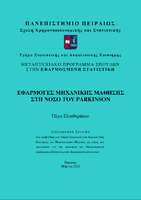Εφαρμογές μηχανικής μάθησης στη νόσο του Parkinson
Applications of machine learning in Parkinson's disease

Προβολή/
Λέξεις κλειδιά
Νόσος Πάρκινσον ; Μηχανική μάθηση ; Στατιστική ; Holter ; Νευρωνικά δίκτυα ; Machine learning ; Parkinson's disease ; Neural networks ; StatisticsΠερίληψη
Στις μέρες μας, η μηχανική μάθηση έχει γίνει βασικό εργαλείο για την
καταπολέμηση της νόσου του Πάρκινσον. Με την ικανότητά της να αναλύει τεράστιες
ποσότητες δεδομένων, η μηχανική μάθηση μπορεί να βοηθήσει στην έγκαιρη
ανίχνευση και την ακριβή διάγνωση της νόσου του Πάρκινσον. Μπο ρεί επίσης να
βοηθήσει στην παρακολούθηση της εξέλιξης της νόσου και στην πρόβλεψη των
αποτελεσμάτων των ασθενών. Οι αλγόριθμοι μηχανικής μάθησης μπορούν επίσης να
χρησιμοποιηθούν για τον εντοπισμό πιθανών νέων φαρμακευτικών στόχων και την
αξιολόγηση της αποτελεσματικότητας των υφιστάμενων θεραπειών. Επιπλέον, η
μηχανική μάθηση μπορεί να βοηθήσει στην ανάπτυξη εξατομικευμένων σχεδίων
θεραπείας για τους ασθενείς, λαμβάνοντας υπόψη τις ατομικές διαφορές στην
παρουσίαση της νόσου και την ανταπόκριση στις θεραπείες. Εν γένει, η μηχανική
μάθηση έχει τη δυνατότητα να φέρει επανάσταση στην κατανόηση και τη θεραπεία της
νόσου του Πάρκινσον, βελτιώνοντας τελικά τα αποτελέσματα και την ποιότητα ζωής
των ασθενών. Στην παρούσα εργασία, γίνεται μια εκτενής περιγραφή σε προβλήματα
που εφάπτονται στην αντιμετώπιση της Νόσου του Πάρκινσον, ενώ δίνεται
περισσότερη έμφαση στη διαχείριση δεδομένων από Holter ώστε να παρθεί απόφαση,
χρησιμοποιώντας μεθόδους μηχανικής μάθησης, για το ποιοι ασθενείς είναι
κατάλληλοι για «εν τω βάθει εγκεφαλική διέγερση».


